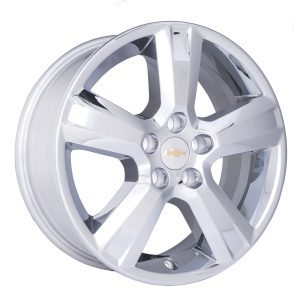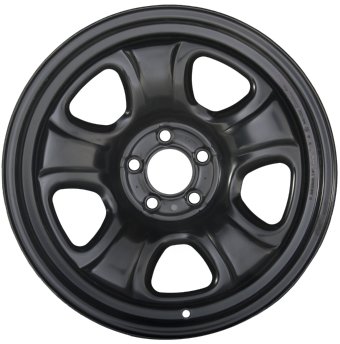Wheels are one of the most essential components of a vehicle. While many people focus on the appearance of wheels and rims, they play an important role in how your vehicle operates. How Wheels Work Wheels serve the function of translating an engines power into motion. When a driver presses…
Aluminum Alloy Rims Vs. Steel Rims
Choosing the right wheel for your vehicle is an extremely important decision that could affect you financially, both in gas mileage and the longevity of your wheels. When it comes down to it, there are two types of wheels to choose from: aluminum alloy wheels and steel wheels (or alloy rims and steel rims).
Each type of material has its advantages and disadvantages. From price to performance, this guide will compare the pros and cons of each type of wheel in order to help you make an educated buying decision on your upcoming wheel purchase.
What are Aluminum Alloy Wheels? Alloy Rims Pros & Cons
If you are looking for wheels with style and performance, then buying alloy wheels is the route to go. Alloy wheels are more appealing to the eye than steel wheels and generally perform better than steel wheels. They’re made of multiple metals, most commonly aluminum or magnesium and are lighter than steel which reduces fuel consumption and increases performance through improved acceleration, braking, maneuverability (steering), and handling. They are also resistant to corrosion and dust, which eliminates the need for repairs as the wheels begin to age.
There are a large variety of alloy wheels to choose from as they are cast into many different designs. Alloy wheels have more customization options available and more advanced styling for finishes than their steel counterparts.
 Alloy wheels are much lighter than steel wheels, which allows them to operate at a higher performance in most conditions. Fuel economy is a big advantage of alloy wheels, especially in the city. With the lighter frame of alloy wheels, it will put less strain on the suspension of your car. This will also allow for faster acceleration.
Alloy wheels are much lighter than steel wheels, which allows them to operate at a higher performance in most conditions. Fuel economy is a big advantage of alloy wheels, especially in the city. With the lighter frame of alloy wheels, it will put less strain on the suspension of your car. This will also allow for faster acceleration.
The main disadvantage of alloy wheels is their durability. When impacted by the road, alloy wheels tend to bend and even crack more easily than tougher steel wheels. The aesthetic appearance of alloy wheels is also threatened as they are more easily prone to cosmetic damage.
Alloy wheels today are the standard wheels used for most cars do to their high-performance and appealing look. While they are more expensive than steel wheels, the majority of OEM wheels on the market are alloy wheels.
Steel Wheels Pros & Cons
For drivers looking for a cheaper more durable alternative, steel wheels are the way to go. Steel wheels are significantly stronger than alloy wheels making them the ideal choice for use in the Winter and for more powerful vehicles.
 Unlike alloy wheels, durability is a major advantage when it comes to steel wheels. Cracking a steel wheel is nearly impossible and bending a steel wheel would require tremendous force. As long as you maintain the layer of paint on your wheel as needed, your steel wheels will not rust.
Unlike alloy wheels, durability is a major advantage when it comes to steel wheels. Cracking a steel wheel is nearly impossible and bending a steel wheel would require tremendous force. As long as you maintain the layer of paint on your wheel as needed, your steel wheels will not rust.
Cosmetic damage is not typically an issue with steel rims as they naturally look rough and tough. This also makes it easier to repair a bent steel wheel since there is no fear of damaging the appearance. With tools, such as a hammer, you can easily revert your bent steel wheel back into shape.
Another advantage of steel wheels is the price. If the need arises to replace your steel wheel, the cost will be inexpensive compared to an alloy replacement. There are fewer options offered compared to the selection provided by alloy wheels, but steel wheels in general do not have an aesthetically pleasing look regardless. However, wheel covers are available in several styles to improve the look of your vehicle if desired.
The extra “unsprung weight” created from steel wheels can lower your vehicle’s center of gravity. This extra weight can decrease your vehicle’s agility and ability to accelerate. This can also put a strain on the suspension and other parts of your vehicle.
The extra weight of steel wheels is an advantage during the winter months. The extra friction will help keep your vehicle from slipping on the ice and snow. For this reason, and for the purposes of preserving their alloy wheels in the best condition possible, many owners will switch to steel wheels when the weather outside turns bad. However, the increased weight means higher gas mileage and decreased performance when compared to alloy wheels.
Steel rims offer little compatibility with vehicles not made for them. It is not recommended to use steel wheels on a vehicle that was made for use with alloy wheels. Additionally, steel wheels are limited in size as most are made with 16″ size rims or less. Thus, you cannot downsize to a set of steel rims on high-performance vehicles and larger vehicles. Finally, there simply aren’t as many designs or options to choose from like there are with alloy wheels.
Finding the Best Wheel for Your Vehicle
On average, alloy wheels cost around $50 and steel wheels can be found as low as $30. When making any buying decision, price is normally the most determining factor, but you have to take into consideration things like gas mileage and future maintenance when making a wheel purchase as well. However, if you don’t live in a climate where winter comes every year, you’re probably better off with going with alloy. If you do live in a colder climate, steel may be the best option depending on the size of your vehicle’s tires, especially if you’re someone who often needs to drudge through the snow.
Whether you choose alloy wheels or steel wheels, Blackburn OEM Wheel Solutions has the wheel that’s right for your vehicle. Our online Wheelfinder will help you quickly navigate through our large inventory of high-quality OEM wheels to fit your vehicle. We also offer OEM Hubcaps, Center Caps & Trim Rings, Vintage Hubcaps, and more!







